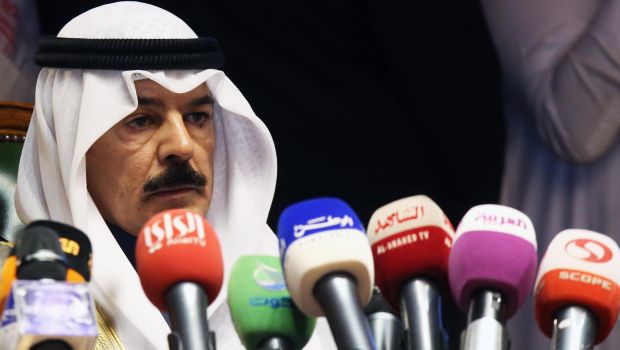
Kuwaiti Interior Minister Sheikh Mohammad Al-Khalid Al Sabah speaks during the 33rd meeting for the Gulf Cooperation Council (GCC) interior ministers at Bayan Palace in Kuwait city on November 26, 2014. (AFP PHOTO/YASSER AL-ZAYYAT.)
Riyadh, Asharq Al-Awsat—Gulf states are considering adopting the terror lists issued by Saudi Arabia and the United Arab Emirates, Kuwait’s Interior Minister Sheikh Mohamed Al-Khalid Al-Sabah said on Wednesday.
In comments to Asharq Al-Awsat, Kuwait’s Interior Minister said that Gulf Cooperation Council (GCC) states are coordinating with one another to investigate the Saudi and Emirati terror lists with a view to adopting them, confirming that the adoption of a joint terror list was discussed at the recent Doha summit.
Al-Sabah warned against “complacency” in dealing with Gulf security, stressing that combating terrorism is something that no single Gulf country can do alone, but something that all GCC states must work together on.
He hailed GCC efforts to promote regional security and stability, despite the regional and international challenges facing the Gulf, stressing that the GCC states must remain steadfast in the face of attempts to divide them.
The UAE announced a list of illegal terrorist organizations in November, formally designating 80 groups, including the Muslim Brotherhood and Yemen’s Houthis, as “terrorist groups.” Riyadh had earlier issued its own formal terror list, designating the Muslim Brotherhood, Al-Qaeda, and Yemen’s Houthis as terrorist groups, in March. The Islamic State of Iraq and Syria (ISIS) and the Al-Nusra Front, Al-Qaeda’s affiliate in Syria, have also been formally designated as terrorist groups by Abu Dhabi and Riyadh.
Gulf leaders discussed the ongoing war on terror during the Doha summit earlier this week, formally taking the decision to establish a regional police force based in Abu Dhabi and a joint naval force based out of Bahrain in order to beef up regional security.
The GCC leaders also said that a joint military command will be formed following further discussions. The final communique of the Doha summit stressed the GCC’s firm renunciation of “terrorism and extremism in all its forms and manifestations whatever its motives and justifications and whatever its source,” pledging to continue efforts “to drain its sources of financing.”
The final communique also stressed “the commitment of the GCC countries to combating the ideology upon which terrorist groups are founded,” affirming that Islam as a religion is “innocent of such ideology.”
In comments to Asharq Al-Awsat following the Doha summit, GCC Secretary-General Abdullatif Al-Zayani said: “GCC countries are considering holding an international conference with the countries concerned with combating terrorism in order to coordinate efforts.”
